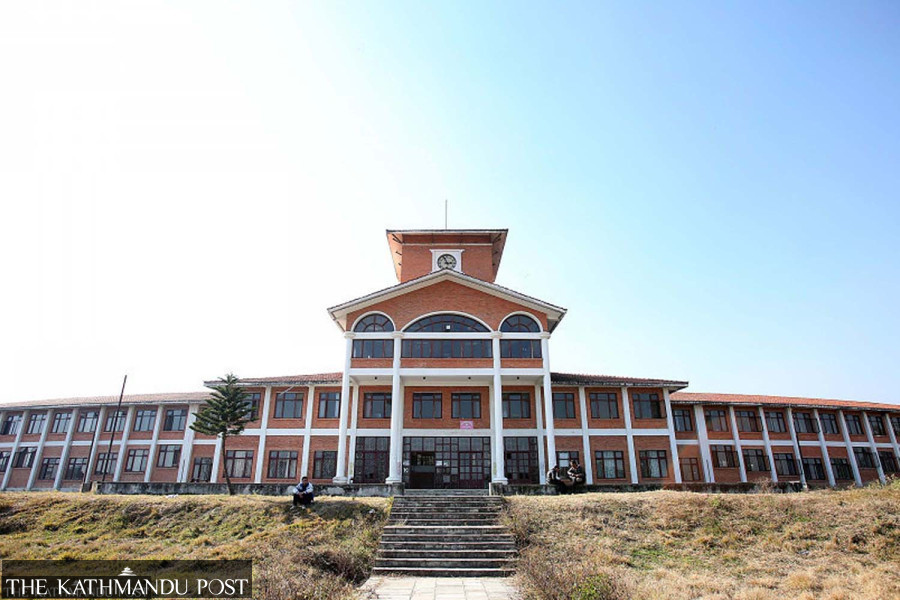National
Supreme Court bars TU from drafting rules to hire teachers without competition
Nullifying two separate amendments to the Tribhuvan University rules related to teacher-staff recruitment, the Supreme Court warns the institution against such provisions to avoid free competition.
Binod Ghimire
The Supreme Court has barred Tribhuvan University from drafting any regulation in the future to recruit staff and teachers through internal competition while avoiding free competition.
Nullifying two separate amendments to the TU rules related to the appointments of teachers and staff, restricting free competition, the top court has warned the country’s oldest and largest varsity against such legal revisions in the future.
In April 2021, the TU Service Commission announced an open competition to fill 580 lecturer positions. The examination was scheduled to begin in the first week of September.
However, the university’s part-time lecturers padlocked the commission’s office and lobbied the political leadership to stop such competition. Under pressure, the commission postponed the tests.
On November 20, 2021, the senate chaired by then prime minister Sher Bahadur Deuba revised the rules, introducing a provision to allow the teachers and employees who had served continuously for 10 years in contract or under temporary arrangement to participate in the “special internal competition”.
They would get the permanent posting if they manage to secure the pass mark. The amended rule said the provision would be valid until November 2o22.
However, another senate meeting on June 27, 2023 made an amendment to continue the provision for the last time. The university couldn’t call a competition as the Supreme Court issued an interim order against them. Responding to a writ petition by students Ramesh Bista and Manita Khatri, a division of justices Nahakul Subedi and Sunil Pokharel on February 18 annulled the amended provisions.
“Now on, no provisions should be introduced [in the law] that limit or undermine open competition, and all actions and decisions must uphold fair, transparent, and merit-based recruitment processes,” reads the full text of the verdict released on Friday.
The court rules that some special arrangements like internal competition can be made but that should be an exception. In TU’s case, such arrangements have been made at least four times since the second people’s movement.
“Allowing internal competition multiple times is not just an arbitrary move but also a misuse of delegated legislative authority and legal loopholes,” reads the verdict. “The academic institutions are taken as the promoters of meritocracy. But if universities themselves don’t follow meritocracy, it would be difficult to practise it in other sectors of society.”
The court has taken restriction in the free competition time and again as a deterioration in the university’s value system.
It all started with the then Girija Prasad Koirala government in 2006.
The first government formed after the people’s movement of 2006 decided to hire 1,380 part-time and 460 “course contract” teachers in the colleges of Tribhuvan University as teaching assistants.
Then-prime minister Girija Prasad Koirala on August 24, 2006 signed an agreement with the teachers who held a hunger strike at Ratna Park demanding jobs uncontested. Most of the 1,840 teachers, who got fixed-term appointments in the government-run varsity, got to teach as part-timers without competition.
Eight years later, in 2014, the assistant teaching staff pressured the university administration to make special arrangements for their permanent posting without a competitive test.
The university’s Service Commission in March 2014 called vacancies for competitive tests. However, the teachers’ unions locked then vice-chancellor Hira Bahadur Maharjan, Rector Guna Nidhi Neupane and Registrar Chandra Mani Poudel in a room at the Research Centre for Educational Innovation and Development for 27 hours in April 2014 and ultimately forcing them to sign an agreement to revise the vacancy and call an internal competition.
However, 480 of them failed in the internal competition and three other competitions held later. They have time and again, using their political links, been able to get favourable legal arrangements in their interest. The new verdict, however, has given a rest to such acts in the future.




 9.7°C Kathmandu
9.7°C Kathmandu














